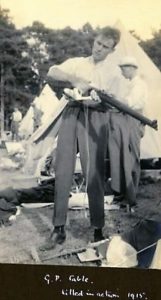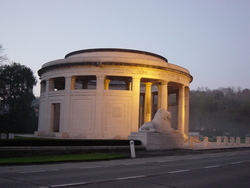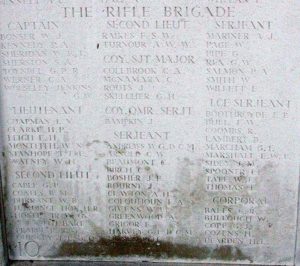Early Life
George was born on the 5th Dec 1891, the son of Baron Ernest Cable (1st Baron Ideford) and Lilian Sarah Sparkes whose family home was Lindridge, Bishopsteignton from 1913. The birth was registered in Newton Abbot, George was educated at Harrow College (where the census of 1911 says he was born in India) and Bournemouth.

George Cable cleaning his rifle in OTC camp in 1914
Source Photo with permission from Julian Walker
It appears he may have studied at Magdalen College, Oxford as he attended the Oxford University Officer Training annual camps in 1913 and 1914. There is a poignant photograph of him cleaning his rifle at one of these.
George then may have moved to London.
Like the Koebels, the Cable family had a long association with India with George’s great grandfather leaving from the east of London in the early 19th century to make good in the East India Company. The family prospered and Ernest Cable became Sheriff of Calcutta; he was later knighted by George V and was a partner in one of the largest jute companies in India.
For reasons unknown (but because of his wife’s connections with Devon) they came to the UK in 1913 and lived at Lindridge, Bishopsteignton. Baron Cable quickly returned to India after the outbreak of the first world war but his wife became involved in the war effort and featured in various good works such as setting up Teignmouth Hospital. It is interesting to note that there was no evidence of the decline of the great estates referred to in the national narrative. In fact after Baron Ideford’s death in 1927 the estate passed to Edward Charles Benthall (another jute magnate) who married George’s sister Ruth. The estate did not fall into decline until after WW2 when Ghandhi nationalised the jute industry.
Military Experience
We do not know for sure but after his education George may have then gone onto the Inns of Court which would have been the recruiting ground of the London Rifle Brigade in which he enlisted at the outbreak of war.
He gained the rank of 2nd Lieutenant in the 5th Battalion. Looking at the dates, it is likely he fought at the Battle of Aubers Ridge in France.
“This battle was an unmitigated disaster for the British army. No ground was won and no tactical advantage gained. “[1]
Death and Burial
He was to be killed in action at Fromelles, during the second battle of Ypres on 9th May 1915 aged 23 years.

Ploegsteert Memorial Source www.cwgc.org
He is buried at the Ploegsteert Memorial , Arrondissement de Mouscron, Haunaut, Belgium. [2]

London Rifle Brigade Memorial Panel Ploegsteert Memorial Source www.cwgc.org
Panel 10 Memorial ID 12699106
There is a small newspaper index card from Andrews Newspapers that says:
CABLE – IN MEMORY OF GEORGE PICKERSGILL CABLE , SEC Lieut Rifle Brigade, killed in action, Aubers, May 9 1915. “ Thou shouldst be living at this hour”
Descendants
From looking at other heritage and ancestry sites and local newspapers there is a good deal to be found out about Lord and Lady Cable and further research about the Jute industry would no doubt reveal more. There appears to be a painting of Lord Cable in the National Portrait Gallery.
George had 2 sisters Noorouz Weston, Cable, 1890 and Ruth McCarthy, Cable.[3]
